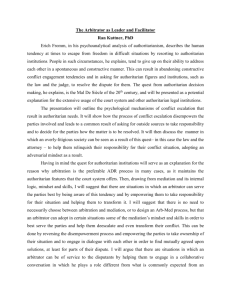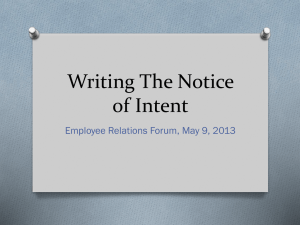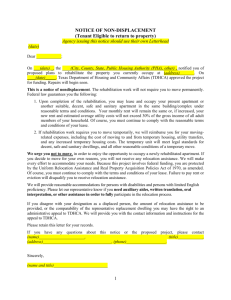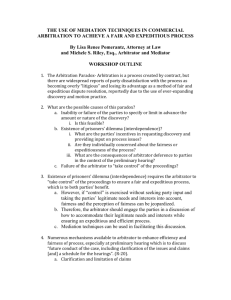THE DIFFERENCES BETWEEN INDEPENDENT EXPERT
advertisement
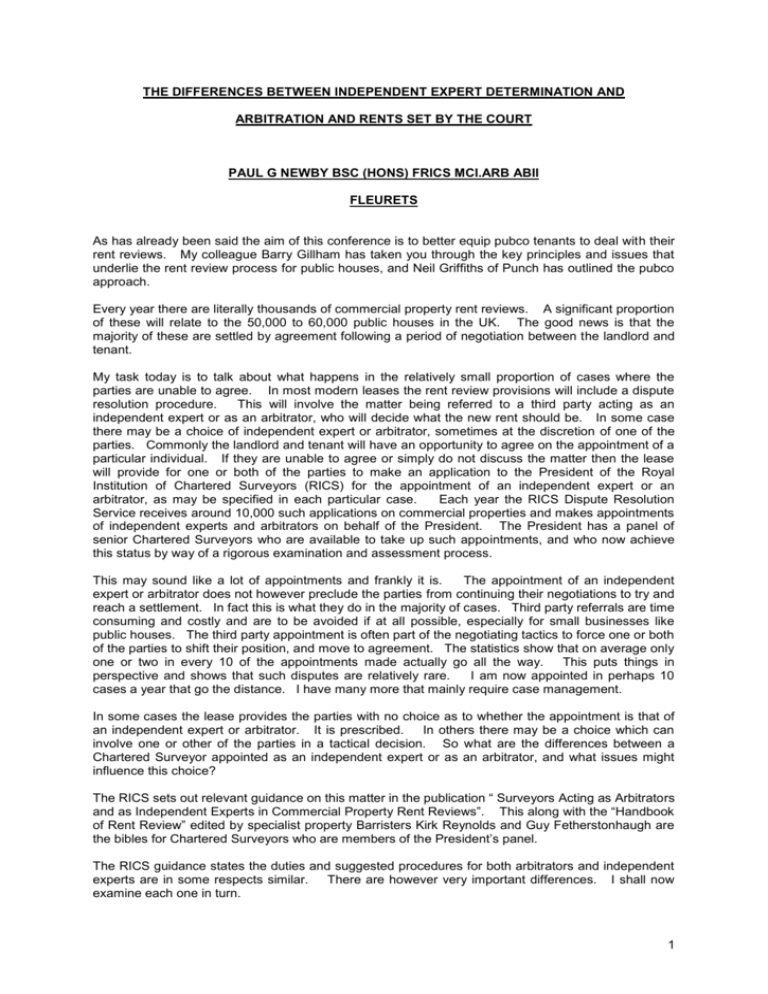
THE DIFFERENCES BETWEEN INDEPENDENT EXPERT DETERMINATION AND ARBITRATION AND RENTS SET BY THE COURT PAUL G NEWBY BSC (HONS) FRICS MCI.ARB ABII FLEURETS As has already been said the aim of this conference is to better equip pubco tenants to deal with their rent reviews. My colleague Barry Gillham has taken you through the key principles and issues that underlie the rent review process for public houses, and Neil Griffiths of Punch has outlined the pubco approach. Every year there are literally thousands of commercial property rent reviews. A significant proportion of these will relate to the 50,000 to 60,000 public houses in the UK. The good news is that the majority of these are settled by agreement following a period of negotiation between the landlord and tenant. My task today is to talk about what happens in the relatively small proportion of cases where the parties are unable to agree. In most modern leases the rent review provisions will include a dispute resolution procedure. This will involve the matter being referred to a third party acting as an independent expert or as an arbitrator, who will decide what the new rent should be. In some case there may be a choice of independent expert or arbitrator, sometimes at the discretion of one of the parties. Commonly the landlord and tenant will have an opportunity to agree on the appointment of a particular individual. If they are unable to agree or simply do not discuss the matter then the lease will provide for one or both of the parties to make an application to the President of the Royal Institution of Chartered Surveyors (RICS) for the appointment of an independent expert or an arbitrator, as may be specified in each particular case. Each year the RICS Dispute Resolution Service receives around 10,000 such applications on commercial properties and makes appointments of independent experts and arbitrators on behalf of the President. The President has a panel of senior Chartered Surveyors who are available to take up such appointments, and who now achieve this status by way of a rigorous examination and assessment process. This may sound like a lot of appointments and frankly it is. The appointment of an independent expert or arbitrator does not however preclude the parties from continuing their negotiations to try and reach a settlement. In fact this is what they do in the majority of cases. Third party referrals are time consuming and costly and are to be avoided if at all possible, especially for small businesses like public houses. The third party appointment is often part of the negotiating tactics to force one or both of the parties to shift their position, and move to agreement. The statistics show that on average only one or two in every 10 of the appointments made actually go all the way. This puts things in perspective and shows that such disputes are relatively rare. I am now appointed in perhaps 10 cases a year that go the distance. I have many more that mainly require case management. In some cases the lease provides the parties with no choice as to whether the appointment is that of an independent expert or arbitrator. It is prescribed. In others there may be a choice which can involve one or other of the parties in a tactical decision. So what are the differences between a Chartered Surveyor appointed as an independent expert or as an arbitrator, and what issues might influence this choice? The RICS sets out relevant guidance on this matter in the publication “ Surveyors Acting as Arbitrators and as Independent Experts in Commercial Property Rent Reviews”. This along with the “Handbook of Rent Review” edited by specialist property Barristers Kirk Reynolds and Guy Fetherstonhaugh are the bibles for Chartered Surveyors who are members of the President’s panel. The RICS guidance states the duties and suggested procedures for both arbitrators and independent experts are in some respects similar. There are however very important differences. I shall now examine each one in turn. 1 The Arbitrator 1. The arbitrator acts (as does a judge) only on evidence and arguments submitted to him, but he is able to draw the parties’ attention to matters of which they may not be aware. He is also able to take the initiative in ascertaining facts and the law. His award must lie between the extremes contended for by the parties. He is however expected to use his expertise in assessing the relevance and quality of the evidence and arguments submitted to him. 2. The arbitrator cannot decide without receiving evidence from the parties, or from one of the parties when he is ‘proceeding in default’ by the other, except where proceeding on his own initiative. 3. The procedure for arbitration is regulated by the Arbitration Act 1996. 4. A party to an arbitration can seek and (through the Courts) compel disclosure of documents or the attendance of witnesses. 5. An arbitrator may not delegate any of his duties, powers or responsibilities, although he can seek assistance. 6. Unless the parties agree otherwise the arbitrator must generally publish his rental award with reasons. 7. In an arbitration the arbitrator can award that one party shall pay all or part of the arbitrator’s fees and all or part of the other party’s costs. He can also assess the quantification of those fees and costs. 8. The arbitrator’s fees can be determined by the Court under the Act. 9. There is some (albeit limited) right of appeal against the award of an arbitrator on a point of law. An arbitrator’s award may also be challenged in the Courts on the basis that the arbitrator did not have jurisdiction or on the grounds of ‘serious irregularity’. If a serious irregularity is shown the Court may (in whole or part) remit the award, set it aside or declare it to be of no effect. 10. Providing he has not acted in bad faith the arbitrator is not liable for negligence. The Independent Expert 1. The independent expert has the duty of investigation to discover the facts, details of relevant comparable transactions and all other information relevant to his valuation (though he may receive information regarding these matters from the parties). 2. The independent expert bases his decision upon his knowledge and investigations, but he may be required by the lease to receive submissions from the parties. 3. There is no legislation governing procedure for the independent expert and he must therefore settle his own contract with the parties. 4. The independent expert has no power to compel disclosure of documents or the attendance of witnesses. 5. The independent expert has a duty to use his own knowledge and experience in arriving at his decision. However, during the course of his investigation the independent expert may seek routine administrative or other assistance from any other person. This is always 2 provided that he is in a position to vouch for the accuracy with which such tasks are carried out. 6. Unless required by the lease the independent expert will generally make his determination without detailed accompanying reasons. 7. An independent expert has no power to make any order as to his fees, or as to the costs of a party, unless such a power is conferred upon him by the lease or by agreement between the parties. 8. There is no procedure for formal determination of an independent expert’s fees. 9. There is no right of appeal against the determination of an independent expert, though in some very limited circumstances the Court may set it aside. 10. The independent expert is liable in damages for any losses sustained by a party through his negligence. This is so notwithstanding that the Court will not interfere with a final and binding determination that he has made. These are the key differences between the two roles. It is worth noting that leases are not drafted in a universally standard format, and terminology varies. As a result there is the opportunity for ambiguity to arise as to whether the appointment is that of an independent expert or an arbitrator. If the lease in referring to the appointment of a Chartered Surveyor mentions “arbitrator”, “arbitration” or the “Arbitration Acts” then the general presumption is that the parties intended the appointment of an arbitrator to arise. Where the lease refers to an “independent expert” or an “expert” then the general presumption will follow the same common sense view. If the lease refers to a “surveyor” or a “valuer” only, then the position may be unclear. The appointed surveyor should resolve such difficulties with the parties before proceeding. It is also in the interests of the parties to ensure this is the case to save the possibility of wasted time and cost later on. So an arbitrator acts like a judge. Considering and weighing up the evidence put before him, and ultimately deciding which of the parties arguments he prefers on each of the key issues. He will then put all of these judgements together in ultimately making an award on rent within the range of the figures put forward by the parties to the dispute. Arbitration is generally preferred for larger or more valuable disputes, and for testing evidence. An independent expert however is simply acting as a valuer, a recognised professional in his field whether this be shops, offices, factories or indeed public houses. The independent expert must use his professional expertise in assessing the rental value of the premises concerned. In doing so the information put forward to him by the parties may be of assistance, but he is not bound by it in any way, and the rent he decides may bear little or at least limited relationship to the figures advanced by the parties. Independent expert determination is generally to be preferred where the parties want a quicker and more cost effective means of resolving their dispute. Where a choice of appointment exists, what then are the issues that might influence a landlord or a tenant to go for an independent expert rather than an arbitrator or vice versa? Let me suggest a few practical examples. 1. Where one party is in a dominant position with regard to the evidence, it may opt for an arbitrator, to ensure that the decision is not based on any other information. Arbitration will give the party an added edge if it considers that its representations will be more credible than those on the other side. 2. Where one or both parties wish to obtain the “ right” answer. You may think this a strange remark. Surely an arbitrator is also trying to get the right answer? It is the case however that these processes can lead to an arbitrator or an independent expert reaching different conclusions on the same property with the same review date and essential facts. 3 3. A party may be frustrated in trying to obtain key documentary or witness information. Only through arbitration will it have the opportunity to seek to compel the other side or another party to co-operate. 4. Perhaps the most common reason for making the choice is the arbitrator’s power to award costs. This can be a powerful tool both before and during the arbitration process. The risk of losing and having an award of some or all of the costs of the arbitrator and the opposing party made against you can be a key motivator to encourage settlement of the dispute. That said lately I am seeing an increasing number of leases where the independent expert is given a contractual power to determine the allocation of his own costs and sometimes those of the parties too. 5. Although the Courts have made it quite clear that arbitrators’ awards will only be set aside or overturned in exceptional circumstances, one or both parties may wish to leave this possibility open if it does not like the arbitrator’s decision. It is all but impossible to do the same with an independent expert’s determination. Above I refer to an arbitrator’s and sometimes an independent expert’s power to award costs. Where such a power exists the general principle is that a winning party can expect to receive an award of some or all of its costs against the other side. The rule that “costs follow the event” will apply unless there are other factors to be taken into account, such as the conduct of the parties. During their negotiations the parties will advance their views on rent on a “without prejudice” basis. Such views cannot subsequently be held against the parties when their honest opinion as to the rent is set out before the arbitrator or the independent expert. During the process however the parties may legitimately make other settlement offers known as “Calderbank Offers”, so called as a result of the divorce case of Calderbank -v- Calderbank. Such an offer made in writing will include the heading “without prejudice save as to costs”. This is a document that can only be produced after the decision on rent has been made and relates to how an award on costs may be decided. Such an offer does not constitute an opinion of rent but sets out a commercial proposition, which if accepted is intended to avoid the cost and risk of the third party referral. It is like a payment into Court made in other types of litigation. If the decision is at or better than the figure set out in the Calderbank Offer, then the party making that offer can generally be said to have won, and thereby be entitled to an award on costs. One issue to bear in mind is that of the “near miss”, where a Calderbank Offer just falls short of a winning position. This is quite a common occurrence in rent reviews, which by their nature do not involve exact science. The views of arbitrators and independent experts on near misses vary. Some will consider a fractional award of costs, others are against it on the principal that a win is 100% or nothing. In view of these differences it is worth remembering that it may be possible for the parties to agree at the outset what approach the third party should take towards a near miss. I turn now briefly to the subject of lease renewals. As Barry Gillham has said the situation where a lease is coming to an end imposes certain statutory obligations on both the landlord and the tenant. Legal advice should be obtained. If a tenant wishes to stay, on a new lease, it generally has such a right, unless the landlord successfully opposes this right on specified grounds, most commonly that it requires the property for its own occupation or that it has a firm intention to redevelop the property. At lease renewal the general presumption on the basis of the so called “O’May Rules” is that a tenant is entitled to a new agreement on similar terms to the old one, save for necessary modernisation. The parties will however have to agree a new rent, but what happens if they cannot agree? If agreement proves impossible then the statutory framework provides for the matter to be determined by a Judge in the County Court. The Judge will usually make a decision having regard to expert evidence put forward on behalf of the landlord and tenant. As you can imagine this can prove to be an expensive process involving Court time, solicitors and possibly barristers as well. 4 There is an alternative for parties to a lease renewal concerned about Court based conflict resolution. “PACT” or Professional Arbitration on Court Terms” is a scheme that was set up jointly by the RICS and the Law Society. On unopposed lease renewal disputes of all types PACT provides for one of two methods of dispute resolution, namely arbitration or independent expert determination. The issues in dispute are referred to an independent third party rather than being dealt with by the Court. The parties may agree on the identity of the appointee or once again use the services of the RICS Dispute Resolution Service. The processes I have described above lend themselves well to dealing with lease renewal disputes. This offers a swifter, more flexible and cheaper process compared with the Court route. There is the added advantage, where this is important to one or both parties, of confidentiality, something not applicable to dealings in open Court. There are two other issues that I would mention in relation to rents at lease renewal. If the parties’ dispute is dragging on perhaps over a number of issues then providing the relevant notice requirements have been satisfied (beware!) either the landlord or the tenant can apply to the Court to determine an interim rent. The latest date that the application can be made is six months after the actual termination of the lease. Where a new lease of the whole of the property is unopposed the interim rent will generally be the same as that payable under the new lease. Perhaps a more effective way of achieving the same result is a lease that incorporates a rent review on the last day. The parties will then have a means for determining the market rent for the property at that point, immediately before the commencement of a new lease. In the event of dispute there will then be provision for the appointment of an arbitrator or independent expert to determine the new rent. In closing I remind you that Barry Gillham has already mentioned various website and written references, where you will also find some useful information on this topic. 5


